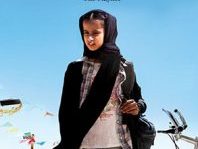What are the implications of a 10-year-old Saudi Arabian girl dreaming of something unheard of? Something no young girl there has ever done? Yet something that is commonplace almost everywhere else? The dream of owning her own bicycle?
Bicycles, she is told, are for boys. They are dangerous for girls. They threaten her social standing and her virginity.
But still, Wadjda is determined to have her bike. This coming of age story is laced with grim social impediments and religious hypocrisy.
The story that emerges pits Wadjda against her school, her mother and her extended family. Only her best friend, a young male playmate with his own bicycle, believes in her. Together they conspire to teach Wadjda to ride his bike. Meanwhile, Wadjda begins saving money to make her dream come true.
A possible way toward earning enough money to buy her own bike appears in the most ironic of forms; if she wins a Koran reciting contest, the prize money will put her over the top. She wins. But the school principle, upon hearing that she plans to buy a bike, diverts the prize money to a more acceptable social cause.
In telling this story, writer/director Haifaa Al-Mansour examines the changing expectations of Saudi women. But even in telling this story Haifaa gets caught up in the restrictions on women. She is the first Saudi woman film director to film a feature film entirely in Saudi Arabia. To do so, she had to hide in a van when shooting street scenes, giving direction with a two-way radio while viewing the action on a monitor. She could not be seen in public giving orders to the men in the crew.
Through persistence and changing circumstances, Wadjda, of course, eventually gets her bike. We can assume that from the opening scenes. But in viewing this story we get a rare glimpse inside a country that is largely off-limits to western eyes. We see how young girls are formally socialized into society through both home and school. Wadjda's young friend participates in his uncle's election for local office. One also soon sees the seamier underbelly of the society that Wadjda challenges. Her school principle, in charge of teaching Muslim morals to her students, serves as a married man's mistress. Failing to father a son, Wadjda's father takes a new bride in an attempt to assure that his name lives on, leaving her mother socially and fiscally stranded. Ironically, it also opens up new possibilities.
One is lead to believe that in Saudi Arabia a new day is about to dawn. That women are beginning to assert themselves. That at least in some quarters, men may be open to wives with not only education but also careers. But one also is left with the feeling that if a new day is dawning, dawn may yet last a very long time.



Tina Siemens
Calvin King
Bob Gerber